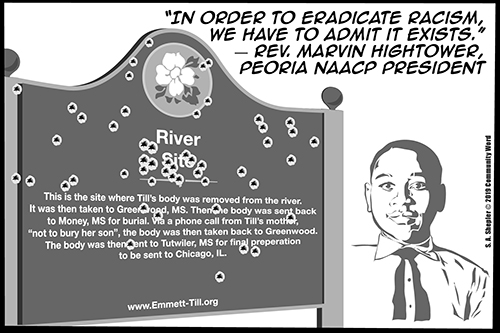 In the din and clamor over the 2020 presidential election, it’s easy to feel adrift and unable to influence the direction of our country. Maybe it’s even easy to feel a little apathetic, a little despair. But Bryan Stevenson and Leonard Pitts destroy the option of apathy or despair.
In the din and clamor over the 2020 presidential election, it’s easy to feel adrift and unable to influence the direction of our country. Maybe it’s even easy to feel a little apathetic, a little despair. But Bryan Stevenson and Leonard Pitts destroy the option of apathy or despair.
Nearly 100 people attended a free public screening in November at Illinois Central College of the documentary “True Justice: Bryan Stevenson’s Fight for Equality.”
Stevenson is an attorney, founder of the Equal Justice Initiative, organizer of the National Memorial for Peace and Justice (referred to as the lynching museum) and defender of the indigent on death row. The work is emotional, challenging, sometimes heart breaking and inspiring.
Stevenson tells about a mentally disabled man on death row who, in his final phone conversation before his electrocution, comforted Stevenson who was filled with despair and sorrow for not being able to stop the electrocution.
The condemned man told Stevenson he appreciated his help, and he loved him.
Another time, a man later proven to be innocent, asked a guard if there was anything he could do so he would not smell the burning flesh of other inmates as they were being electrocuted.
The guard told the inmate he’ll get used to the smell and someday it will be the smell of his burning flesh that will pervade the prison.
Stevenson was able to accumulate evidence and spent years appealing the case. A court finally, fairly assessed the conviction and freed the man. But, of course, 14 years on death row extracts mental and physical damage beyond repair. The man did not die by electrocution but did die due to causes clearly linked to his unjust, tortured incarceration.
There is no way to watch this documentary and feel apathy.
In a recent column, journalist Leonard Pitts wrote about the destruction of memorial markers for Emmett Till, the young 14-year old African American child who was kidnapped, tortured and killed for extending a flirtatious greeting to a white woman. Till’s bereaved mother insisted on an open casket so the world could see the severity of the beating that left her son’s right eye punched out of its socket and dangling on his check by the optic nerve. His dead body had been thrown into the Tallahatchie River in Mississippi.
One Emmett Till memorial marker after another has been vandalized and destroyed, Pitts wrote, citing a member of the Emmett Till Memorial Commission who said both whites and African-Americans implored the commission to stop bringing up this gruesome history.
It takes courage to understand true history. Understanding leads to change. A mythical version of history devoid of truth and based on racism serves only to nurture racism, hate and apathy.
In his remarks at the documentary, the Rev. Marvin Hightower, president of the Peoria NAACP, told the audience, “Racism is embedded into the fabric of the United States. Racism gives birth to injustice. In order to eradicate racism, we have to admit it exists.”
Then: “Repentance, reparations, reconciliation,” he said. “It is up to each of you to make the change.”
ICC Professor Anthony White told the audience, “It’s easy to be apathetic if you don’t know the history.”
He said, “Everyone has to work on this issue. We all have a stake in this. The solution is not going to come from yelling at each other. We need a conversation. We need a collective conversation. We can’t let things get crazier.”
